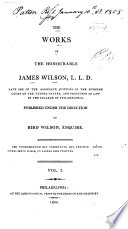 | James Wilson - Law - 1804 - 494 pages
...selfevident. The second is, from selfevident principles, to draw conclusions, which are not selfevident. The first of these is the province, and the sole province, of common sense, and, therefore, in its whole extent, it coincides with reason ; and is only another name for one branch... | |
 | Benjamin Rush - American essays - 1806 - 388 pages
...things self-evident ; the second is to draw conK k " elusions that are not self-evident from things that are. The " first of these is the province, and the sole province, ofcom" mon sense, and therefore it coincides with reason in its whole " extent, and is only another... | |
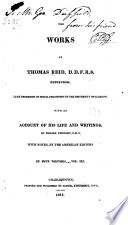 | Thomas Reid - Philosophy - 1815 - 434 pages
...offiees, or two degrees. The first is to judge of things self-evident ; the seeond to draw eonelusions that are not self-evident from those that are. The first of these is the provinee, and the sole provinee of eommon sense ; and therefore it eoineides with reason in its whole... | |
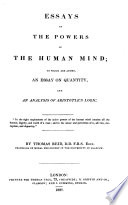 | Thomas Reid - Act (Philosophy). - 1827 - 706 pages
...speech, and in writing, they arc inseparable in their nature. We ascribe to reason two offices, or two degrees. The first is to judge of things self-evident...conclusions that are not selfevident from those that arc. The first of these is the province, and the sole province of common sense ; and therefore it coincides... | |
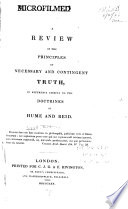 | Alfred Lyall - Truth - 1830 - 682 pages
...Reason,' he observes, ' has two offices or degrees: first, to judge of things self-evident; secondly, to draw conclusions that are not self-evident from those that are. The first is the sole province of common sense ; and, therefore, it coincides with reason throughout its whole... | |
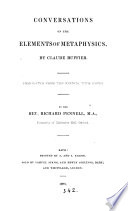 | Claude Buffier - 1838 - 224 pages
...speech, and in writing, they are inseparable in their nature." " We ascribe to Reason two offices, or two degrees. The first is, to judge of things self-evident; the second, to draw f Harris's Works, vol. i., p. 286. conclusions that are not self-evident from those that are. The first... | |
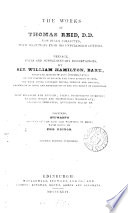 | Thomas Reid - 1846 - 1080 pages
...speech and in writing, they are inseparable in their nature. We ascribe to reason two offices, or two degrees. The first is to judge of things self-evident ; the second to draw conclusions that arc not self-evident from those that are. The first of these is the province, and the sole province,... | |
 | Henri Édouard Schedel - Faith - 1858 - 508 pages
...speech and in writing, they are inseparable in their nature. We ascribe to reason two offices or two degrees. The first is to judge of things self-evident...the province and the sole province of common sense ; and therefore it coincides with reason in its whole extent, and is only another name for one branch... | |
 | Alexander Campbell Fraser - Rationalism - 1858 - 168 pages
...with the suggestion of the following passages : — "We ascribe to Reason," says Reid, "two offices. The first is, to .judge of things self-evident ; the second, to draw conclusions that are not self -evident from those that are." — Assays, vi. chap. 2. Now of these offices the former is characteristically... | |
 | James McCosh - History - 1860 - 512 pages
...follows Locke in fixing on self-evidence as a decisive test. " We ascribe to reason two offices, or two degrees. The first is to judge of things self-evident;...province, and the sole province, of common sense, and therefore it coincides with reason in its whole extent, and is only another name for one branch... | |
| |